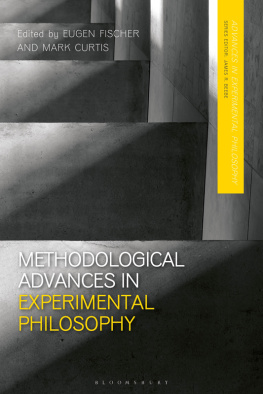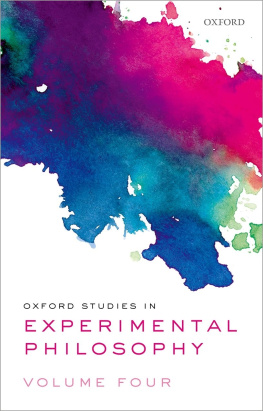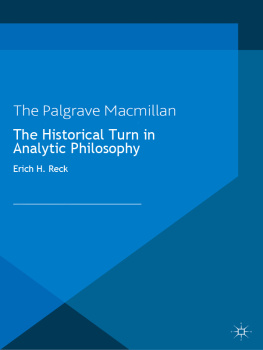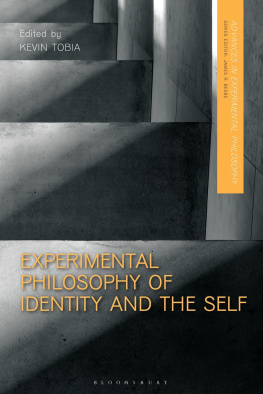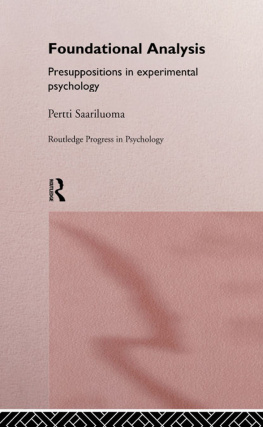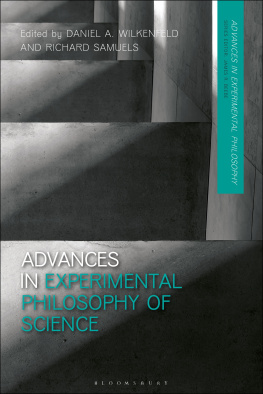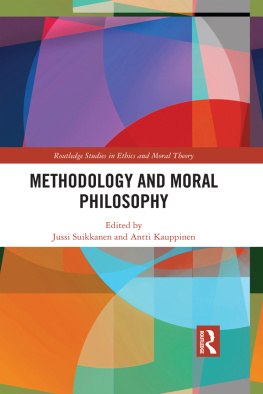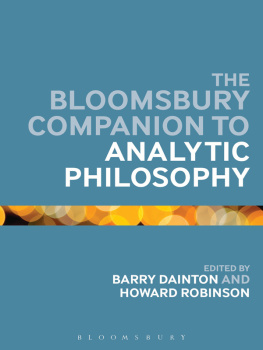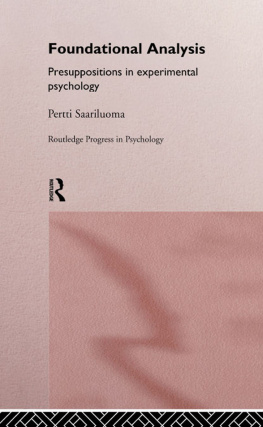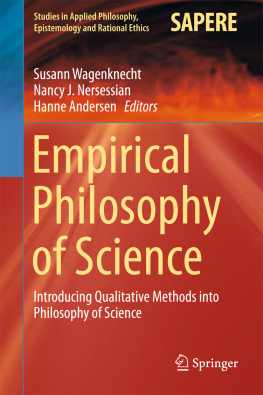Methodological Advances in
Experimental Philosophy
Advances in Experimental Philosophy
Series Editor:
James Beebe, Associate Professor of Philosophy, University at Buffalo, USA
Editorial Board:
Joshua Knobe, Yale University, USA
Edouard Machery, University of Pittsburgh, USA
Thomas Nadelhoffer, College of Charleston, UK
Eddy Nahmias, Neuroscience Institute at Georgia State University, USA
Jennifer Cole Wright, College of Charleston, USA
Joshua Alexander, Siena College, USA
Empirical and experimental philosophy is generating tremendous excitement, producing unexpected results that are challenging traditional philosophical methods. Advances in Experimental Philosophy responds to this trend, bringing together some of the most exciting voices in the field to understand the approach and measure its impact in contemporary philosophy. The result is a series that captures past and present developments and anticipates future research directions.
To provide in-depth examinations, each volume links experimental philosophy to a key philosophical area. They provide historical overviews alongside case studies, reviews of current problems and discussions of new directions. For upperlevel undergraduates, postgraduates and professionals actively pursuing research in experimental philosophy, these are essential resources.
Titles in the series include:
Advances in Experimental Epistemology, edited by James R. Beebe
Advances in Experimental Moral Psychology, edited by Hagop Sarkissian and Jennifer Cole Wright
Advances in Experimental Philosophy of Language, edited by Jussi Haukioja
Advances in Experimental Philosophy of Mind, edited by Justin Sytsma
Advances in Religion, Cognitive Science, and Experimental Philosophy, edited by Helen De Cruz and Ryan Nichols
Methodological Advances in
Experimental Philosophy
Edited by
Eugen Fischer and Mark Curtis

Figures
Tables
Lara Alcock Mathematics, Loughborough University, UK
Mark Alfano Philosophy, Delft University of Technology, Netherlands/Australian Catholic University, Brisbane, Australia
Adrian J. T. Alsmith Psychology, Institut Jean Nicod, Paris, France
Hein van den Berg Philosophy, Institute of Logic, Language and Computation, University of Amsterdam, Netherlands
Arianna Betti Philosophy, Institute of Logic, Language and Computation, University of Amsterdam, Netherlands
Roland Bluhm Philosophy and linguistics, Independent Scholar, Berlin, Germany
Justin Bruner Philosophy, University of California, Irvine, CA, USA
Mark Curtis Philosophy, University of East Anglia/Anglia Ruskin University, Cambridge, UK
Rodrigo Daz Philosophy, University of Bern, Switzerland
Michelle DiBartolo Psychology, John Hopkins University, Baltimore, MD, USA
Paul E. Engelhardt Psychology, University of East Anglia, Norwich, UK
Eugen Fischer Philosophy, University of East Anglia, Norwich, UK
Annie Galizio Psychology, Utah State University, Logan, UT, USA
Andrew Higgins Philosophy, Illinois State University, Normal, IL, USA
Matthew Inglis Mathematical Cognition, Loughborough University, UK
Kristen Lew Mathematics, Texas State University, San Marcos, TX, USA
Matthew R. Longo Cognitive Neuroscience, Birkbeck, University of London, UK
Shaun Nichols Philosophy, University of Arizona, Tucson, AZ, USA
Cailin OConnor Logic and Philosophy of Science, University of California, Irvine, CA, USA
Yvette Oortwijn Philosophy, Institute of Logic, Language and Computation, University of Amsterdam, Netherlands
Paolo Rago Independent data manipulation consultant, So Paulo, Brazil
Juan Pablo Meja-Ramos Mathematics, Rutgers University, New Brunswick, NJ, USA
Evan Reinhold Psychology, College of Charleston, SC, USA
Kevin Reuter Philosophy, University of Bern, Switzerland
Hannah Rubin Philosophy, University of California, Irvine, CA, USA
Chris Sangwin Science Education, University of Edinburgh, UK
Justin Sytsma Philosophy, Victoria University of Wellington, New Zealand
Caspar Treijtel Librarian, University of Amsterdam, Netherlands
Pascale Willemsen Philosophy, Ruhr-University Bochum, Germany
Jennifer Cole Wright Psychology and Philosophy, College of Charleston, SC, USA
Eugen Fischer and Mark Curtis
Experimental philosophy is undergoing exciting transformations. Until recently, the discipline has prominently been associated with the questionnaire-based study of philosophically relevant intuitions (Alexander 2012; Fischer and Collins 2015; Mallon 2016). However, experimental philosophy conceived, quite broadly, as the practice of systematically collecting and analysing empirical data to address philosophical questions or problems (Sytsma and Livengood 2016; cf. Knobe and Nichols 2017) adapts a wide range of empirical methods for a variety of new uses in philosophy, in the study of intuitions and beyond (cf. Nado 2016). To some extent, the recruitment of methods beyond the questionnaire has been part of experimental philosophy since the inception of the movement (e.g. Greene et al. 2001). Currently, however, the uptake of further methods is gathering momentum: this might mark a step change in the larger enterprise of making philosophical questions and problems more empirically and scientifically tractable.
Experimental philosophys new methods include sophisticated paradigms for behavioural experiments from across the social sciences ranging from psycholinguistics to experimental economics as well as computational methods from the digital humanities that can process large bodies of text and data. This volume offers a conspectus of these cutting-edge empirical methods and explores how they can complement questionnaire-based approaches in a variety of philosophical pursuits, across several key areas. The studies reported or discussed herein demonstrate in some cases pioneer the use of their chosen methods in experimental philosophy. The areas of philosophy covered include epistemology and metaphysics, the philosophies of mind and language, the philosophies of science and mathematics, moral philosophy and psychology, as well as the history of ideas.
The questionnaire-based surveys and experiments that have so far been the standard tools of experimental philosophy are convenient, can demonstrably be used to address a very wide range of philosophically relevant questions (see Alexander 2012 and Knobe & Nichols 2017 for reviews) and have generally led to replicable findings (Cova et al. 2018). This volume will make the case for complementing these familiar and useful approaches not by belabouring their limitations and shortcomings (which the following chapters will broach, where relevant), but by positively demonstrating what the alternative methods allow us to do, and the philosophical uses to which their findings can profitably be put.
The first part of the volume focuses on experimental methods drawn from different social sciences. The second part examines computational methods from the digital humanities. In each part, the first chapters discuss how further empirical methods can be put to the service of (natural extensions of) philosophical projects that have been prominently associated with experimental philosophy and rely on or respond to intuition-driven methodologies. In line with a broad conception of experimental philosophy, subsequent chapters then explain how further methods can be recruited for philosophical projects that have not seen much reliance on intuitions. All the methods discussed can be profitably put to more philosophical uses than are presented here, including uses in other areas of philosophy. We therefore encourage readers to also consider chapters which address philosophical topics outside their own immediate areas of interest.
Next page
